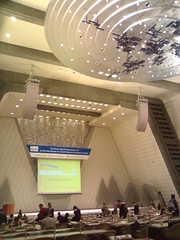Over the past few weeks, college students on several companies have demanded that university endowment funds sell off coal, oil and gas stocks. This growing movement is spurred by the recognition by students that climate change is an urgent issue that needs to be a priority on the national agenda. Many of the students have connected with Bill McKibben of 350.org, an advocacy group for carbon reduction. McKibben has been traveling the country visiting campuses and educating students on the subject of climate change and global warming.
I find this idea for this movement interesting and refreshing, especially in light of comments made in response to a recent blog entitled “Exxon Hates Your Children– Fact, Fiction or Propaganda” in which one responder pointed out the need to get the attention and involvement of shareholders invested in fossil fuel companies in order to find solutions to cleaner energy as opposed to trying to use tactics of consumer boycotts to force change.
While this movement has witnessed some success at some smaller institutions, namely Unity College in Maine, which voted to get out of investments in fossil fuels and at Hampshire College in Massachusetts, which has modified its investment policy in regards to fossil fuels, several of the larger colleges and universities are not budging. In fact, “no school with an endowment exceeding $1 billion has agreed to divest itself of fossil fuel stocks”. Harvard University has stated that it is not considering divesting from companies related to fossil fuels, despite the support of 72% of the undergraduate student body’s recent vote supporting such a measure.
It will be interesting to see the progression of this movement. With climate change becoming a major issue and with the public demanding action on alternative energy sources, it is likely that colleges and universities will be forced to reexamine their policies and fall in line. Interestingly, this movement is seen as an imitation of the successful effort of the 1980s whereby colleges, universities an businesses were successfully pressured to rid themselves of investments in companies doing business under apartheid South Africa.
The green movement is growing everyday, and as the young people, who are the future stewards of this planet get on board, we all can definitely expect to see a day where we all live green, be green.
Sources for Article:
- http://www.nytimes.com/2012/12/05/business/energy-environment/to-fight-climate-change-college-students-take-aim-at-the-endowment-portfolio.html?pagewanted=1&_r=3&hpw&
- http://livegreenbegreen.com/2012/12/06/exxon-hates-your-children-fact-fiction-or-propaganda/










